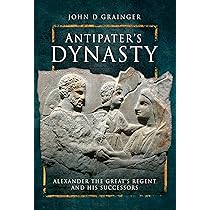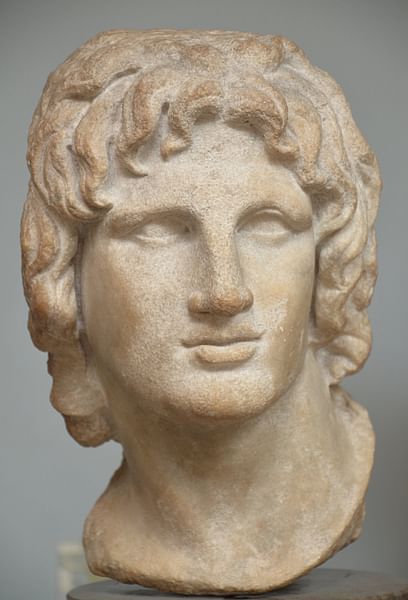Antipater: The Unsung Strategist of Ancient Macedon
Introduction
Antipater, a figure often overshadowed by the titans of antiquity like Alexander the Great and Philip II, was nonetheless an indispensable architect in the construction and maintenance of the Macedonian Empire. Born in Paliura, Macedon, around 397 BCE, Antipater was a contemporary of Philip II and played a crucial yet understated role in the expansive campaigns that shaped the ancient world. His life and influence offer a fascinating glimpse into the inner mechanics of Macedonian politics, military strategy, and dynastic loyalty.
Early Life and Rise to Prominence
Though much of Antipater’s early life remains shrouded in the mists of history, it is believed he was born into a family of notable standing, a factor crucial in not only his education but also his rise through the ranks of Macedonian nobility. Under the reign of Philip II, Antipater quickly proved his loyalty and acumen, serving initially as a capable administrator in the Macedonian court.
His political sagacity and strategic insight became apparent during the early periods of Philip II’s reign, particularly during domestic and military endeavors that aimed to solidify Macedonia’s regional dominance. While others might gain prominence through dramatic conquests or calls to arms, Antipater's strengths lay in his ability to manage, coordinate, and stabilize the burgeoning empire.
The Role of Steward During Alexander’s Campaigns
Antipater’s capabilities truly came to the fore during the reign of Alexander the Great. As Alexander embarked on his legendary conquests, Antipater was appointed regent in Macedonia, responsible for maintaining order across Greek territories and countering threats that could jeopardize the empire's rear guard. This position demanded not only military prowess but also diplomatic skills to navigate the complex relations with Greek city-states and tribal coalitions.
During Alexander’s prolonged absence on his campaigns through Asia, Antipater faced significant challenges at home. Chief among them was the Spartan revolt led by King Agis III around 331 BCE, which threatened Macedonian supremacy in Greece. Demonstrating strategic foresight and military acumen, Antipater successfully crushed the uprising at the Battle of Megalopolis, securing Macedon’s control and maintaining peace on the home front.
Political Machinations and the Struggle for Succession
With the sudden death of Alexander in 323 BCE, the Macedonian Empire was thrown into turmoil. The great king left no clear heir, leading to factions forming around potential successors. Antipater, an old ally deeply invested in the stability of the realm, found himself once more thrust into the limelight of political theater.
During the Wars of the Diadochi, which erupted following Alexander’s demise, Antipater positioned himself as a stabilizing force, seeking to maintain the unity of the empire amid the ambitions of rival generals and satraps. His astute political maneuvers ensured a provisional compromise by the Treaty of Triparadisus in 321 BCE, which redistributed authority among the remaining power brokers of the Macedonian court.
Legacy and Impact
Antipater's death in 319 BCE marked the end of an era characterized by balance and political equilibrium. His legacy, however, lived on through his son, Cassander, who continued to shape Macedonian history amidst the swirling tides of empire. While not as gloriously remembered as the conquerors he served, Antipater's strategies and governance were pivotal in sustaining Macedonian hegemony and laying the foundations for its rulers in the chaotic years that followed Alexander’s death.
Antipater's life offers an extraordinary lens through which to examine the subtle yet profound influences of governance and strategy that lie behind history's grand narratives. As a pivotal figure in Macedonian politics, his efforts were key in maintaining stability during one of the most tumultuous and dynamic periods of classical antiquity.
Antipater’s Relationship with Alexander the Great
The dynamics between Antipater and Alexander the Great have long intrigued historians, as their relationship was complex and multifaceted. As one of Philip II’s trusted strategists, Antipater had already established a solid foundation within the Macedonian hierarchy by the time Alexander ascended to the throne. Initially, their relationship was collaborative, with Antipater acting as a loyal supporter during Alexander’s efforts to consolidate his rule.
However, tensions emerged as Alexander embarked on his ambitious campaigns of conquest. As regent, Antipater held significant power in Europe, managing Macedonian affairs while Alexander was away. This autonomy, combined with his growing influence, eventually led to friction between the two formidable figures. Historical accounts suggest that Alexander was somewhat wary of Antipater’s power and ambition, perceiving him as a potential rival capable of undermining his authority.
Despite these undercurrents of distrust, Antipater's experience and steady governance were indispensable. His unwavering commitment to Macedonia, along with his proven administrative and military capabilities, played a crucial role in maintaining stability across the Hellenistic world during Alexander’s expansive endeavors.
The Spartan Challenge: Battle of Megalopolis
One of the most significant episodes during Antipater’s regency was the conflict with Sparta, led by King Agis III. This confrontation emerged as a formidable test of Antipater’s leadership in the face of a substantial threat to Macedonian dominance in Greece. The Spartans, historically renowned for their military prowess, sought to capitalize on Alexander's absence by rallying support to challenge Macedonian influence.
The culmination of these tensions was the Battle of Megalopolis in 331 BCE, a decisive engagement that underscored Antipater’s strategic acumen. Leading a force of Macedonian and allied troops, Antipater successfully quashed the Spartan insurgents despite their formidable fighting reputation. His victory not only reaffirmed his leadership capabilities but also ensured continued Macedonian supremacy in Greece, safeguarding the empire during Alexander’s campaigns.
The Intricacies of Macedonian Politics
Following Alexander's untimely death, Antipater found himself navigating the turbulent waters of succession and power struggles among the Diadochi, Alexander’s former generals and administrators. This period was characterized by complex political intrigue and shifting alliances, as these leaders vied to carve out influence over the vast territories of Alexander's empire.
Antipater’s diplomacy and calculated decision-making once again came into play. His political maneuvering was instrumental in the temporary reconciliation of warring factions through the Treaty of Triparadisus in 321 BCE. This agreement, albeit fragile, demonstrated his ability to broker compromises and manage competing interests within the fractious world of ancient Macedonian politics.
Moreover, Antipater’s choice of Polyperchon as his successor, bypassing his own son Cassander, emphasized his focus on stability over personal dynastic ambition. This decision, however, sowed seeds of future conflict as it prompted Cassander to eventually rebel, underscoring the enduring challenges of succession in the Macedonian realm.
A Strategic Mind
Throughout his career, Antipater exemplified the qualities of a pragmatic and perceptive leader. His approach was marked by an acute awareness of geopolitical realities and a knack for strategic foresight. Unlike the flamboyant conquerors who relied on dramatic force, Antipater's strength lay in his methodical preparation and adeptness in balancing diverse political and military interests.
His skill in mediation and conflict resolution was pivotal during the years following Alexander’s conquest and the subsequent fragmentation of the empire. Antipater’s ability to manage internal dissent, counter external threats, and maintain alliances demonstrated a comprehensive understanding of the delicate balance of power that characterized the era.
Antipater’s Death and the Aftermath
Antipater’s death in 319 BCE marked a significant turning point for the Macedonian empire, thrusting it into even more profound disarray. The vacuum left by his departure exacerbated existing tensions, and the fragile fabric of authority disintegrated into open conflict as rival factions scrambled to seize control. His passing shone a light on the delicacy of Macedonian stability, which had largely been underpinned by his diplomatic and governing capabilities.
In the ensuing power struggle, Antipater's son Cassander emerged as a prominent figure. Despite their father-son relationship, Cassander engaged in a clash for supremacy against Polyperchon, the successor appointed by Antipater himself. The conflict between Cassander and Polyperchon was emblematic of the turmoil that followed Antipater's demise, reflecting the perennial struggle for dominance in the ancient Macedonian world.
Candidates like Antipater, who combined strategic insight, capable administration, and formidable diplomacy, were rare in the often chaotic and competitive landscape of ancient Macedon. His career and legacy serve as a testament to the significant, albeit frequently underappreciated, role of political and military strategists behind the scenes in shaping history's grand narratives.
Cassander's Rise and Antipater’s Lasting Influence
Following Antipater’s death, the challenge of sustaining Macedonian hegemony fell to Cassander, his son. Despite his father's initial decision to overlook him as heir, Cassander emerged as a central player in the tumultuous period known as the Wars of the Diadochi. He demonstrated political shrewdness reminiscent of his father but with a more aggressive approach towards securing power.
Cassander's rise to prominence involved strategic realignments and robust military campaigns. Notably, he secured alliances with other key figures, such as Ptolemy and Lysimachus, which highlighted Antipater's lasting influence in shaping the diplomatic landscape of the era. Cassander's successful campaigns against both Polyperchon and Olympias, the mother of Alexander the Great, were pivotal in consolidating his power over Macedonia and Greece.
Yet, the shadow of his father loomed large. Many of Cassander’s policies and actions bore the hallmarks of his father's strategies, blending tactful diplomacy with decisive military action. Cassander also recognized the importance of legitimacy and dynastic affiliation by marrying Thessalonike, a half-sister of Alexander the Great, thus intertwining his lineage more deeply with the royal Argead dynasty.
The Cultural and Historical Legacy
While Antipater is often cast in the shadows of more flamboyant figures from his era, his governance and strategic impact provided a foundation that significantly influenced Macedonian and Hellenistic politics for generations. His efforts were crucial in holding the empire together during the fragmented period following Alexander's death and helped to shape the geopolitical contours of the Hellenistic world.
Furthermore, Antipater’s indirect influence extended into the cultural sphere, as he facilitated the dissemination of Greek culture and political structures during his tenure. This contributed to the phenomenon of Hellenization, a process through which Greek language, art, and philosophy proliferated across the Mediterranean and Near East, profoundly shaping the cultural legacy of the ancient world.
His role as a stabilizer during warfare and as an administrator who understood the intricacies of Macedonian and Greek politics exemplifies the indispensable contributions of statesmen in times of transition and turmoil. In many ways, Antipater's strategies and policies prefigured the developments that characterized the Hellenistic Age, where the blending of cultures and the evolution of governance structures laid the groundwork for subsequent historical progressions.
Revisiting Antipater’s Contributions
In the broader sweep of history, Antipater's contributions are often eclipsed by the grand narratives of conquest and exploration associated with his contemporaries. However, a closer examination reveals a multifaceted leader whose strategies were woven into the fabric of one of history's most dynamic eras. His tenure as regent and strategist, navigating both domestic and foreign challenges, attests to a leadership style that prized continuity and balance amid chaos.
Antipater's career also serves as a reminder of the delicate interplay between force and diplomacy in shaping the ancient world. While the exploits of conquerors tend to dominate historical memory, it is the quiet resolve of figures like Antipater that ensured the functioning and longevity of vast empires. His efforts ensured that the Macedonian empire remained a formidable entity, maintaining cohesion through a judicious blend of administration, diplomacy, and military action.
Conclusion
As one of the pivotal figures of his time, Antipater remains a testament to the complexities of leadership during one of history's most transformative periods. His story underscores the importance of strategic foresight and political acumen in maintaining the stability of an empire, attributes that remain essential in governance to this day.
By acknowledging Antipater's role and impact, we gain a richer understanding of the underlying mechanisms that supported the extraordinary achievements of the Macedonian empire. His legacy, seen through the lens of strategic stability and enduring influence, offers invaluable insights into the nuances of ancient power dynamics that continue to resonate within the tapestry of history.
Through the careful study of figures like Antipater, we glean lessons in leadership that transcend their specific historical context, emphasizing the timeless virtues of adaptability, resilience, and prudent stewardship in the corridors of power.









Comments